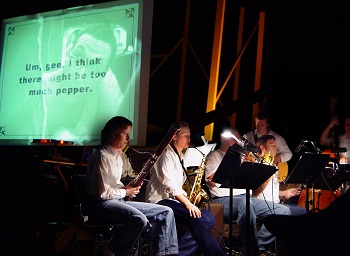Tired Of Talkies?
By Sarah Cobarrubias in Arts & Entertainment on Feb 19, 2010 8:20PM

Image via ACM
You may have seen Palomar at various local venues like the Chicago Cultural Center, Green Mill, or even the Empty Bottle earlier this week. Like their parent organization, Palomar focuses on spreading contemporary classical music to a wider audience, so they perform mostly music by living composers for an array of different audiences. The ensemble consists of ten musicians, but only six, led by artistic director Francesco Milioto, will perform at Sound of Silent Film. This is the festivals fifth year running, and so far it's been a hit, usually selling out both nights. And no wonder - it’s a culturally rich, unique experience and some much needed variety from the endless slew of apocalypse flicks and vampire-romance movies.
Sound of Silent Film Festival is March 10 and 17 at Chopin Theatre, 1543 W Division, 7:30 pm, $10 in advance, $15 at the door, All Ages, Free parking at the Holy Trinity Church at Division and Noble
Check out the featured films after the jump.
The Cabinet of Jan Svankmajer by the Quay Brothers (1984), Music by Doug Johnson
This film takes form of a stop-motion animation divided into nine segments during which a puppet with an open book for a head, takes on a doll as an apprentice, removes its brain, instructs it in lessons of perception and then replaces its brain with an open book. The 14-minute piece is filled with surreal imagery, creepy dolls and a whole lot of symbolism.
Sky Piece for Yayoi Kusama No. 3 by Orson Panetti (2009), Music by Michael Gustav Miller
The third part of a series in homage to Japanese artist Kusama, it references the hallucinations she began experiencing during childhood and which affect her paintings and sculptures even today. Focusing on surreal imagery and dream logic, Panetti says she seeks to "re-contextualize the screening environment and use the cinematic atmosphere as a meditative space for new phenomenological experience."
Copy Shop by Virgil Widrich (2001), Music by Eric Malmquist
A 2001 Oscar Nominee and deemed Best Experimental Short Film by the Worldwide Short Film Festival, this 12-minute film is about an employee who makes a copy of his hand and the copy machine begins producing photos of him. Spooked, he leaves early just to find clones of himself living is life.
Emend by Deco Dawson (1998), Music by Jim Gailloreto
Dawson’s first film, he shot it using Super8, giving it its scratchy, grainy quality. Taking form as a series of still images, this five-minute piece portrays a young woman knitting obsessively in a space so dimly lit only her face and hands are visible. It may symbolize woman’s attempt to escape the repetition of domestic life, but mostly it’s just plain eerie.
Circumstances by Marco Sanges (2007), Music by Michael Allen
Primarily a photographer, Sanges composed this film with a sequence of narrative still photographs. The trailer gives you a taste of the films gorgeous images, depicting subjects that are both sensual and mysterious in nature.
Necrology by Standish Lawder (1971), Music by Kyle Vegter
Filmed in one continuous 12-minute shot, this gloomy black and white piece depicts the expressionless faces of commuters ascending an escalator, disappearing into darkness. It’s a grim, all too real portrayal of modern society and many nine-to-fivers may find themselves sobbing into their hands and questioning their existence.
Carmen by Alexander Payne (1970), Music by Georges Bizet, arranged by Seth Boustead
This is the first short film by Payne, who also wrote and directed Election, About Schmidt and Sideways. It’s a comedy derived from the French opera Carmen, except Don José is a mentally challenged gas station attendant and Carmen is a beautiful woman seducing him to get free gas and candy.